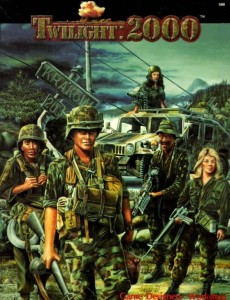For my Favorite Revolutionary Game Mechanic, I was planning on writing about Audience Participation rules for Primetime Adventures, but while it’s one of my favorite game elements, it hasn’t really been added to games that followed its introduction. This is a shame, but I can see how it was forgotten or ignored by later games. Most roleplaying games are thought of as being played in private, around a table or over a virtual tabletop or from the sofa and chairs in the living room. Audience Participation comes in when you’re playing Primetime Adventures in public. When a conflict comes up, people watching the game also get a card to vote for which side of the conflict they want to win. ((In earlier editions, they could also get narration rights, too, so they could definitively say what was going on in the conflict’s aftermath.)) It’s a neat rule that allows for interesting play at game days and conventions.
Huh. I guess I did write about that.
Anyway, my favorite revolutionary game mechanic that was used in games that came after it is found in the pages of Twilight: 2000, and it is similar to how PTA allows the players to take over and control the setting. I know, that’s a strange concept when thinking of Twilight: 2000. Games of that time went like this: the GM is in charge of the world and everything in it, the players are in charge of just one thing — their guy — and can only affect the GM’s world through the efforts of their guy. It’s the GM’s world, you just play in it. And that’s pretty much Twilight: 2000.
Except for one thing that I don’t many people noticed.
 Contacts.
Contacts.
As part of character generation, you get contacts for your soldier. Contacts are people you’ve known before the war, even dirty filthy commies, and with the setting of the war, it’s a bit of an odd coincidence that your Topeka-born G. I. Joe will run into his reporter ex-girlfriend in the wartorn countryside of Poland, but hey, that could really happen. But let’s narrow down a little bit into how you create contacts. You can do it the old-fashioned way, creating a little NPC with stats and everything, or you could do it the revolutionary new game mechanic way and create a generic contact. You leave that contact line blank, except for a generic type. Criminal. Military. Government. Whatever. And then, right there while you’re playing, you can point to an NPC in the scene and say “See that guy right there, The Butcher of Warsaw? I know that guy.”
The GM rolls.
Whoa.
You totally do know The Butcher of Warsaw.
Players taking control of the narrative outside the in-game actions of their characters: completely revolutionary, found in — of all places — Twilight: 2000.



